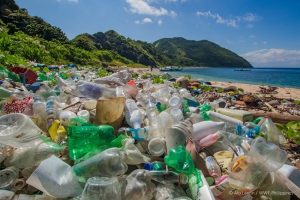Researchers in Circular Plastic Economy have called for collaborations among stakeholders, incentives and enforcement of regulations to solve the challenge of plastic pollution.

They made the call at the opening of the second Stakeholders’ Engagement Workshop on Circular Plastic Economic Innovation Hub in Ibadan, Oyo State.
The project is being funded by British Council in partnership with Pan African University, Life and Earth Sciences Institute (PAULESI)
Other collaborators are De Montfort University, Leicester; Co-Creation Hub; Northumbria University, Newcastle; and Staffordshire University, UK.
In his remarks, the Principal Investigator of the Project, Prof. Muyiwa Oyinlola of the De Montfort University, Leicester, said the project was to build the capacity of Africans to develop local solutions to solve problems of plastic pollution as against importing solutions from elsewhere.
“We want Africans to build the capacity of Africans to solve Africa’s challenges and one of the ways to do that is through our universities.
“This is one of the activities that we are doing, which is bringing stakeholders together for us to have solutions that can result in systemic changes and so we need to collaborate across different boundaries, across sectors and people,” Oyinlola said.
He stressed the need for more government involvement in terms of policies and regulations through incentives to consumers and innovators to solve the problem of plastic waste.
In her keynote speech, the Co-Principal Investigator from Northumbria University, Newcastle, Prof. Titilayo Akinlabi, said the project in the first phase had been able to establish innovation hubs in four universities in Nigeria.
She said the hubs situated in Ahmadu Bello University, Zaria; Obafemi Awolowo University, Ile Ife; University of Nigeria, Nsukka; and the University of Lagos had different objectives aimed at solving the plastic pollution problem.
“We want to get these hubs well established, grounded and fully sponsored for them to deliver on their goals as they have special areas they are looking at, from crushing of the PET bottles to melting and extruding materials to fine-tuning it into filaments to fit into the 3D printer.
“UNN is looking into how to use electrical waste materials to build a 3D printer. So far, all of them are still at the preliminary stages.
“We are reviewing the work that has been done and we are looking at being fully established with getting support from academia, students and early career researchers,” Akinlabi said.
She stressed the need for the government and stakeholders to develop sustainable means of combating metal waste which constitutes about 574 million tonnes globally.
Earlier, Deputy Director, PAULESI, Prof Michael Oladunjoye, said the workshop would birth new collaboration models and strengthen existing partnerships to foster innovation and entrepreneurship in the circular plastic economy.
“We also believe that the project would be the baseline of innovative and sustainable ideas that will proffer long-lasting solutions to the danger of plastic waste disposal in developing countries,” Oladunjoye said.
Also, Co-Creation Hub officer-in-charge of Innovations, Mr Jude Adejuwon, emphasised the need to incorporate the industry into the project and ensure collaboration that would translate the outcomes of the project into products which can be adopted for solving the plastic menace across Africa.
By Ibukun Emiola
